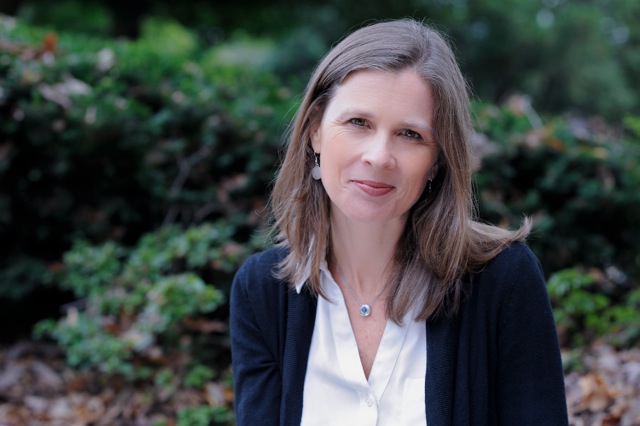Mariana Falconier Leads Couples Workshop
March 9, 2017

From research conducted over the past 12 years, Mariana Falconier knows how financial stress can negatively affect a couple’s relationship.
In 2009, Falconier, an associate professor in Virginia Tech’s Marriage and Family Therapy program in the National Capital Region, decided to use her research findings to help couples caught in such a situation. She teamed with the late Celia Ray Hayhoe, associate professor in the Department of Apparel, Housing, and Resource Management, to develop and pilot test a free TOGETHER workshop where couples learn how to better communicate, handle stress, and tackle money problems.
“The feedback from those workshops was both positive and interesting,” said Falconier. “Generally, after attending the workshop, men reported improved satisfaction with their relationship, and women reported significantly more gains in their financial management behaviors than men did. Both men and women reported they were less stressed over money issues and had more moments of dealing with stress together.”
Falconier said the early pilot test of the workshops, held from 2010 to 2013, would not have been possible without internal grant support from the Virginia Tech College of Liberal Arts and Human Sciences and an external grant from the Fahs-Beck Fund for Research and Experimentation.
Fast forward to fall 2015. The successful pilot TOGETHER Program evolved into a $7.5 million, potentially five-year project with funding from the Administration of Children and Families, the Office of Family Assistance, and the Healthy Marriage and Responsible Fatherhood initiative, all within the U.S. Department of Health and Human Services.
Falconier serves as program director and Jinhee Kim, an associate professor and family finance Extension specialist at the University of Maryland, College Park, as associate director. Both are principal investigators.
Falconier emphasized that she and Kim could not have developed the grant proposal without the invaluable technical assistance provided by the Virginia Tech Institute of Society, Culture, and Environment.
“The significant funding affords us the opportunity to arm many more couples with the knowledge and skills that are so important to improving communication, solving problems, reducing stress, and successfully handling their finances,” said Falconier.
What makes TOGETHER unique is the inclusion of a 20-hour workshop that teaches relationship skills for communication and problem-solving by centering on economic stress; devotes almost half of the time to financial literacy (typically only one module or topic in relationship enhancement workshops); and focuses on stress management, particularly how partners can manage stress together.
Eight sessions, two-and-a-half hours each, take place in the evenings and on weekends and are available, free of charge, to low-income residents in Northern Virginia and Montgomery County and Prince Georges County in Maryland.
Led by experienced couples therapists and financial counselors, a workshop of four to eight couples includes an informational and teaching component and a skills-building component that involves individual, couple’s, and group activities, such as games and role-playing. Following each session, couples receive homework designed to put skills they learned to use.
For example, they practice communicating with each other by identifying and differentiating facts and emotions and by responding empathically and non-judgmentally to their partner’s stress to provide emotional and practical support.
Sharing personal experiences is encouraged during the workshops. Because the couples tend to be diverse — representing different ages, ethnic and religious backgrounds, marital status, parental status, and sexual orientation — they also learn from each other, Falconier said.
Falconier stressed that TOGETHER is not a “one solution fits all” program.
“While there may be some similarities among them, no two couples are exactly alike,” she said. “There are many different factors at play, including generational and cultural attitudes toward relationships and money. We take all of these into consideration as we help couples find solutions that work best for them.”
Couples also benefit from other components of the TOGETHER Program: case management and employment services. Case management consists of one-on-one meetings with a designated case manager, an assessment of family needs for services, and connecting couples to community resources for needed services. Employment services include referrals to agencies that offer assessment of employment and career needs; job-related education and training; and career coaching and job search assistance.
“These added services are beneficial for those who qualify because healthy family relationships, personal well-being, effective parenting, and employment and financial stability are all important factors in achieving successful, long-term results,” Falconier said.
The only prerequisites for participating in the program are that couples must be at least 18 years of age and must have lived together for a minimum of one year.
Because the project is subject to rigorous evaluation, couples are either randomly assigned to an intervention or control group. The intervention couples receive all services free of charge and may receive up to $280 in gift cards for completing questionnaires and attending the TOGETHER workshop.
The control couples do not participate in the 20-hour workshop, the case management, or employment services, but may receive up to $160 in gift cards for completing assessments and a three-hour financial workshop.
To date, 80 couples have enrolled in the TOGETHER Program, 40 control group couples and 40 intervention group couples.
Written by Barbara Micale





